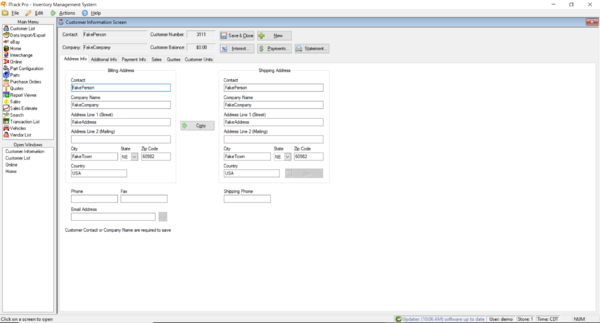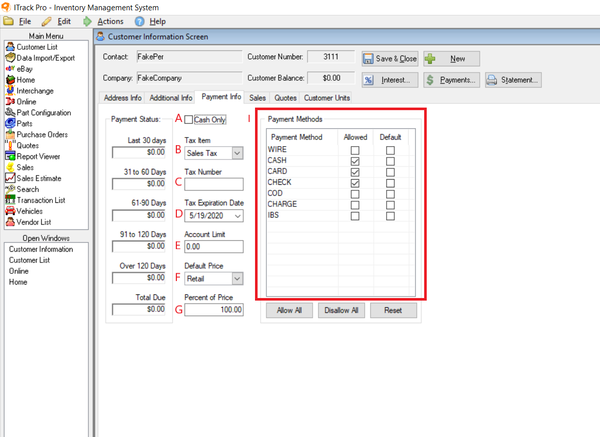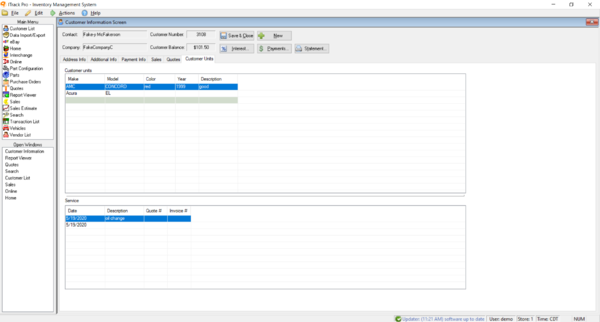Difference between revisions of "ITrack/Pro/Customer Screen"
Cellsworth (talk | contribs) |
Daytonlowell (talk | contribs) |
||
| (28 intermediate revisions by 8 users not shown) | |||
| Line 1: | Line 1: | ||
[[Image:Pro_Customer_Information_1.png|thumb|right|600px|Customer Information Screen]] | [[Image:Pro_Customer_Information_1.png|thumb|right|600px|Customer Information Screen]] | ||
From this screen you will be able to monitor all of the information about your customers. From the Customer | From this screen you will be able to monitor all of the information about your customers. From the Customer Screen you will be able to add and edit customers. Accessing this screen is done via the [[ITrack/Pro/Customer List Screen|Customer List]] screen in the main menu. | ||
==Address Tab== | |||
You can fill out the '''Billing Address''' information on the left. While it is possible to manually put in different information for the '''Shipping Address''', simply clicking the ''copy'' button between the two will copy the info from the billing address to the shipping address. | |||
The Map button located below the Copy button will bring up | The Map button located below the Copy button will bring up Google® Maps and show a map and driving directions from your location to the customer's location. At this point you may choose use any of the other tabs on the screen such as Additional Info or Payment Info. Instructions for these tabs are located below. | ||
You may also print a statement by clicking on the Statement button, or apply payments for the customer by clicking on the Payments button. | You may also print a billing statement for an individual customer by clicking on the Statement button, or apply payments for the customer by clicking on the Payments button. You may also create a new customer by clicking on the New button in the upper right corner or close by clicking on the Save & Close button. | ||
If you want to continue adding information about your customer, or want to check the history of this customer, the tabs following Address Info will be useful. | If you want to continue adding information about your customer, or want to check the history of this customer, the tabs following Address Info will be useful. | ||
==Additional Information Tab== | |||
Click on the Additional Info tab located to the right of the Address Info tab. From this screen you can enter more information about the customer such as an email address, a web page address, and other important information. | Click on the Additional Info tab located to the right of the Address Info tab. From this screen you can enter more information about the customer such as an email address, a web page address, and other important information. | ||
The Option and Value fields are particularly useful. You can enter in specific things you want to know about each customer. Click Add Option to add a new question. Click the Show on Customer List Screen box if you want your new question to show up on the Customer List Screen. | The Option and Value fields are particularly useful. You can enter in specific things you want to know about each customer. Click Add Option to add a new question. Click the Show on Customer List Screen box if you want your new question to show up on the Customer List Screen. | ||
Then, in the Values field, answer the question you asked in the Option field. This Option will now appear on all customers' screens. | Then, in the Values field, answer the question you asked in the Option field. This Option will now appear on all customers' screens. | ||
Now, if you go to the Customer List Screen, you can search by the new Option you entered. ([http://wiki.isoftdata.com/index.php/Image:Pro_Customer_Additional_Info_1.png Additinal Info Tab screen shot]) | Now, if you go to the Customer List Screen, you can search by the new Option you entered. ([http://wiki.isoftdata.com/index.php/Image:Pro_Customer_Additional_Info_1.png Additinal Info Tab screen shot]) | ||
Another thing to take note of is the Active checkbox. When this box is checked then the customer is listed as an active customer (someone who still does business with you), if the box is unchecked then the customer is listed as inactive (someone who no longer does business with you). Unless the 'Show Inactive Customers' checkbox is selected, you will not able to automatically view inactive customers in the Customer List Screen. | |||
[[Image:Pro_Payment_Information_1.png|thumb|left|600px|Payment Information Screen]] | [[Image:Pro_Payment_Information_1.png|thumb|left|600px|Payment Information Screen]] | ||
==Payment Information Tab== | |||
The next tab is the Payment Info tab. From here, you can see the payment status of the customer, choose payment methods you will accept from the customer and other payment information such as an account limit. | The next tab is the Payment Info tab. From here, you can see the payment status of the customer, choose payment methods you will accept from the customer, and other payment information such as an account limit. | ||
*'''A''' The Cash Only check box prevents the customer from charging. | *'''A''' The Cash Only check box prevents the customer from charging the transaction on a card. | ||
*'''B''' The Tax Item field allows you to choose the default tax item to use when quoting or | *'''B''' The Tax Item field allows you to choose the default tax item to use when quoting or selling to this customer. | ||
*'''C''' The Tax Number field will print the customer's tax number on invoices. | *'''C''' The Tax Number field will print the customer's tax number on invoices. | ||
*'''D''' | *'''D''' The Tax expiration date. Since some customers are tax exempt, their status will need to be updated occasionally. This expiration date indicates when their current status needs to change. | ||
*'''E''' The Account Limit prevents a customer from charging more than the amount you set. | *'''E''' The Account Limit prevents a customer from charging more than the amount you set. | ||
*'''F&G''' These fields allow you to adjust the price for a customer automatically. The default setting is 100% retail, but some customers might pay 100% wholesale or 120% cost or 95% retail (5% discount). | *'''F&G''' These fields allow you to adjust the price for a customer automatically. The default setting is 100% retail, but some customers might pay 100% wholesale or 120% cost or 95% retail (5% discount). | ||
*'''H''' Use Allowed Payment Types to select the payment methods you allow for a customer. | *'''H''' Use Allowed Payment Types to select the payment methods you allow for a customer. | ||
*'''I''' This field allows you to pick all available payment methods, as well as a single default method to be used on the [[ITrack/Pro/Sales Screen|Sales]] Screen. | |||
==Sales Tab== | |||
The next tab is the Sales tab. This tab shows the invoice history for the customer and line items. | The next tab is the Sales tab. This tab shows the invoice history for the customer and line items. | ||
The Reprint button will reprint items you have selected. | The Reprint button will reprint items you have selected. | ||
The Void button will void a payment or invoice, | The Void button will void a payment or invoice. By default this tab only shows invoices that have not been voided but the "Show Voided Documents" check box in the top right can be checked to view voided invoices.([http://wiki.isoftdata.com/index.php/Image:Pro_Sales_Information_1.png Sales Tab screen shot]) | ||
To sort by any column, simply click its header title at the top. To re-order the columns, click and drag it left or right to a desired location. | |||
==Quotes Tab== | |||
The next tab is the Quotes tab. From here you can look at all the quotes that have been given to this customer. A quote can easily be converted to an invoice by highlighting the quote by clicking on it (it will turn blue) and then clicking the Send To Invoice button in the lower left of the screen. From this tab you may also choose to reprint a quote or close a quote. By default this tab only shows open quotes but the "Closed Quotes" check box in the top right can be checked to view closed quotes. ([http://wiki.isoftdata.com/index.php/Image:Pro_Quotes_Information_1.png Quotes Tab screen shot]) | |||
Remember that new quotes are made in the [[ITrack/Pro/Quotes Screen|Quotes]] Screen which can be accessed via the Main Menu. Also keep in mind that double clicking on an invoice or payment will re-open it and that double clicking on a line item will open it in the [[Pro/Parts_Screen|Part Management Screen]]. | |||
==Customer Units Tab== | |||
[[Image:Customer Info Customer Unit Tab.PNG|thumb|right|600px|Customer Units]] | |||
The final tab allows you to keep track of surfaces you have done for your customers. The top list displays vehicles brought in by the customer, while the bottom list displays all services done for the specific vehicle selected (its line will be highlighted blue). | |||
A service entry can be associated with an existing quote or invoice via the quote or invoice number | |||
[[Category:Pro Extensions]] | [[Category:ITrack/Pro/Extensions]] | ||
Latest revision as of 15:46, 22 December 2020
From this screen you will be able to monitor all of the information about your customers. From the Customer Screen you will be able to add and edit customers. Accessing this screen is done via the Customer List screen in the main menu.
Address Tab
You can fill out the Billing Address information on the left. While it is possible to manually put in different information for the Shipping Address, simply clicking the copy button between the two will copy the info from the billing address to the shipping address.
The Map button located below the Copy button will bring up Google® Maps and show a map and driving directions from your location to the customer's location. At this point you may choose use any of the other tabs on the screen such as Additional Info or Payment Info. Instructions for these tabs are located below.
You may also print a billing statement for an individual customer by clicking on the Statement button, or apply payments for the customer by clicking on the Payments button. You may also create a new customer by clicking on the New button in the upper right corner or close by clicking on the Save & Close button.
If you want to continue adding information about your customer, or want to check the history of this customer, the tabs following Address Info will be useful.
Additional Information Tab
Click on the Additional Info tab located to the right of the Address Info tab. From this screen you can enter more information about the customer such as an email address, a web page address, and other important information. The Option and Value fields are particularly useful. You can enter in specific things you want to know about each customer. Click Add Option to add a new question. Click the Show on Customer List Screen box if you want your new question to show up on the Customer List Screen. Then, in the Values field, answer the question you asked in the Option field. This Option will now appear on all customers' screens. Now, if you go to the Customer List Screen, you can search by the new Option you entered. (Additinal Info Tab screen shot)
Another thing to take note of is the Active checkbox. When this box is checked then the customer is listed as an active customer (someone who still does business with you), if the box is unchecked then the customer is listed as inactive (someone who no longer does business with you). Unless the 'Show Inactive Customers' checkbox is selected, you will not able to automatically view inactive customers in the Customer List Screen.
Payment Information Tab
The next tab is the Payment Info tab. From here, you can see the payment status of the customer, choose payment methods you will accept from the customer, and other payment information such as an account limit.
- A The Cash Only check box prevents the customer from charging the transaction on a card.
- B The Tax Item field allows you to choose the default tax item to use when quoting or selling to this customer.
- C The Tax Number field will print the customer's tax number on invoices.
- D The Tax expiration date. Since some customers are tax exempt, their status will need to be updated occasionally. This expiration date indicates when their current status needs to change.
- E The Account Limit prevents a customer from charging more than the amount you set.
- F&G These fields allow you to adjust the price for a customer automatically. The default setting is 100% retail, but some customers might pay 100% wholesale or 120% cost or 95% retail (5% discount).
- H Use Allowed Payment Types to select the payment methods you allow for a customer.
- I This field allows you to pick all available payment methods, as well as a single default method to be used on the Sales Screen.
Sales Tab
The next tab is the Sales tab. This tab shows the invoice history for the customer and line items. The Reprint button will reprint items you have selected. The Void button will void a payment or invoice. By default this tab only shows invoices that have not been voided but the "Show Voided Documents" check box in the top right can be checked to view voided invoices.(Sales Tab screen shot) To sort by any column, simply click its header title at the top. To re-order the columns, click and drag it left or right to a desired location.
Quotes Tab
The next tab is the Quotes tab. From here you can look at all the quotes that have been given to this customer. A quote can easily be converted to an invoice by highlighting the quote by clicking on it (it will turn blue) and then clicking the Send To Invoice button in the lower left of the screen. From this tab you may also choose to reprint a quote or close a quote. By default this tab only shows open quotes but the "Closed Quotes" check box in the top right can be checked to view closed quotes. (Quotes Tab screen shot)
Remember that new quotes are made in the Quotes Screen which can be accessed via the Main Menu. Also keep in mind that double clicking on an invoice or payment will re-open it and that double clicking on a line item will open it in the Part Management Screen.
Customer Units Tab
The final tab allows you to keep track of surfaces you have done for your customers. The top list displays vehicles brought in by the customer, while the bottom list displays all services done for the specific vehicle selected (its line will be highlighted blue).
A service entry can be associated with an existing quote or invoice via the quote or invoice number


